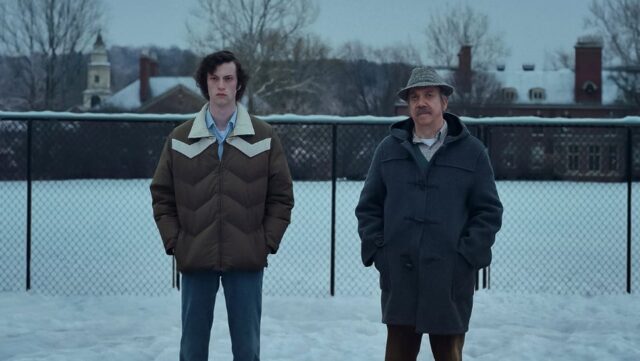
The post The Holdovers: Held Back, by Scott Nye appeared first on Battleship Pretension.
The Holdovers calls its shot immediately, with a string of 1970s-style logos for companies that did not exist then (including production company Miramax and distributor Focus Features). Its opening credits, superimposed on various shots establishing the film’s setting – a New England boarding school in said decade – jitter a little, as though they were actually put there through analog film practices. The rest of the film has little specks of dirt and scratches on the grainy images, as though the film being run through the projector had seen a slight amount of wear and tear. All this despite the fact it was shot on the ARRI Alexa Mini, a very fine camera that offers a lot of robust image integrity similar to celluloid, but nevertheless a digital one.
It is, in short, attempting to present itself as a facsimile of a 1970s production, and while the above may seem overly technical or nitpicky, it is in fact an embodiment of the film’s entire central problem – it offers the simulacrum of things we associate with a good, sturdy, quality film, without doing the real work to craft one.
Star Paul Giamatti and director Alexander Payne reunite nearly twenty years after their independent sensation Sideways, with Payne bowing out of scripting duties for only the second time in his career. This one comes from David Hemingson, a longtime writer/producer for television (his credits include Just Shoot Me, How I Met Your Mother, and he created Kitchen Confidential and Whiskey Cavalier), whose pilot script Payne encouraged be expanded into a feature.
All the film’s significant shortcomings start there, and trickle up, save where Payne and the cast are able to stamp them down. Giamatti plays Paul Hunham, a strict history teacher who, with no plans of his own over the Christmas break, takes on the duties of overseeing the kids whose parents can’t whisk them away for vacation. That number begins at five and soon trickles to one, Angus (newcomer Dominic Sessa), after the other four catch a lucky break out of there and Angus’s mother can’t be reached for permission. The third wheel in the actors’ tricycle that keeps this thing in motion is Da’Vine Joy Randolph (Dolemite is My Name, The Lost City), the school cook who’s mourning the loss of her son in Vietnam.
Each of them is quite good. Giamatti and Sessa have the most to play and run with it, wielding a barrage of clever dialogue, ostentatious insults, and general grievances with relish. Having spent the past seven years in a TV black hole on Billions, his only lead role in that period being 2018’s spectacular Private Life, this feels like something of a return to form for Giamatti. If you were to describe every quirk of his character at once, it would be enough to overwhelm any actor and bore any audience, but his sense of specificity keeps us curious even as the screenplay threatens to burden him.
Sessa’s newcomer status makes their scenes together feel like something new, fresh, and alive, and he gives Angus just the right edge of burn-it-all-down curiosity that never quite elevates his rebellious teen from a stock type, but reminds us why we love it. Randolph has a little less on the page, mostly as the source of depressed wisdom that Hunham needs before the film carts her off for a bit altogether, but she holds onto Mary’s bitterness as a consistent note to play that makes a lot of potentially-routine work really sink in.
From there, though, the film wheels out a succession of one-dimensional characters whose only purpose is to convey some bit of plot or demonstrate disproportionate kindness to one of the aforementioned three. The film’s early interest in the other four boys left behind, who show a great deal of nuance, does nothing to service the tone of the rest of the film, while characters like Carrie Preston’s too-cheerful teacher/barmaid, Andrew Garman’s too-stern headmaster, and Naheem Garcia’s too-cordial custodian are given scene after scene to reveal nothing new about themselves or this world, just too prod the leads to be a little bit more of something they’re not quite. Those are but three of I-count-at-least-a-dozen players of various sizes who offer nothing and often reveal less. While the plotting makes a few cunning left turns, the inevitable slog towards we-all-learned-something-today-didn’t-we keeps drawing it back to form rather than embracing the wilder side it occasionally suggests it at least knows of.
Which brings me back to the 70s, where this film would like to live, but in which it cannot compete. If it calls to mind The Last Detail, Harold and Maude, Paper Moon, The King of Marvin Gardens, California Split, Alice Doesn’t Live Here Anymore, or other ramshackle stories from the time of odd people thrown together, preferably with a little travel involved (a departure to Boston is among the film’s near-high points), I’ve no doubt its makers would find compliment in it, as they have worked terribly hard to garner such associations. But those associations only work if one transmits fondness for them to this, much like a newer Indiana Jones movie might lean on a reference to earlier iterations of itself. In asking for comparisons to the greats, The Holdovers only exposes its timidity and lack of curiosity.
Its kinship is closer to the feel-warm dramas of the 1980s, films like Ordinary People or The Dead Poets Society, if those were drafted much more quickly and carelessly. Those films, fine as they are, suggest wildness is but a passing fancy on one’s way towards domesticity rather than a state of being that cannot be truly corralled. The Holdovers, expanding in theaters just ahead of Thanksgiving, will indeed make for a charming evening with a family that “just wants to see a good film,” but it will never be the picture it thinks itself to be, nor, eventually, a truly memorable one.
The post The Holdovers: Held Back, by Scott Nye first appeared on Battleship Pretension.
The post The Holdovers: Held Back, by Scott Nye appeared first on Battleship Pretension.








